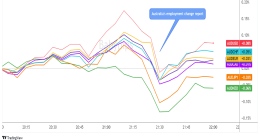

But that was an easy, and relatively crude, case of disinformation. Iowa showed that the platforms are reluctant to police posts by Americans that spread rumors or suspicion but fall short of outright impersonation. As news of the Iowa mishaps emerged Tuesday night, Republicans kicked into high gear online, with everyone from Trump campaign manager Brad Parscale to Trump offspring Eric and Donald Jr. claiming that the caucus had been “rigged.” Facebook and Twitter have declined to take these posts down, since they don’t fit the narrow category of lies about when, where, or how to vote that the platforms have promised to remove. That means it will be up to party officials and their supporters to lead the charge.
Shulman says that misinformation, rather than disinformation, poses the bigger threat next week. “The worst fear is that someone says something, and even if they didn’t mean it to be untrue or misleading or wrong, it could create confusion,” Shulman said. “And I think anything that creates confusion could deter people from going to the polls.”
There are plenty of opportunities for non-malicious screw-ups in a high-profile event like a primary. Members of the media and other outside observers may not always be as familiar with the ins and outs of the process, like the way in which delegates are awarded, as they should. “Because of how many people are just coming into the state for the first time and covering our races, I think there might be a lack of context for some things that could result in misinformation,” Shulman said. Add in live tweeting and the ease with which things can go viral, and it can be a recipe for widespread confusion. The key, she said, is to respond quickly, before someone picks up the faulty information and runs with it—especially a campaign that might like to pounce on an incorrect report showing them in the lead. “If a campaign could grab onto it and try to promote that piece of misinformation,” she said, “by the time the certified vote comes out, it might cause some concern.”
Another priority for the party is to push out accurate information about voting. “We’ve seen in the past few weeks people saying that Republicans can vote in our primary—they can’t,” Shulman said. “And we responded.” More proactively, they’ve also published an online voter guide with quick links to voter registration, polling sites, and absentee voting.
There are, of course, cases that all the guides and data in the world appear unable to stop. In Iowa Tuesday, the Secretary of State (a Republican) quickly debunked a “report” from the right-wing activist group Judicial Watch claiming that voter registration rates in eight counties were higher than the number of adults living there. That didn’t prevent it from being boosted on Twitter and Facebook and used to argue for tighter voter ID laws.
New Hampshire is no stranger to electoral conspiracy mongering. Months after the 2016 election, Donald Trump himself clung to the discredited rumor that “thousands” of voters were bused over from Massachusetts to illegally cast ballots, costing him New Hampshire’s four electoral votes. Nebulous claims of fraud, meanwhile, underlay the state’s draconian voter ID law, passed in 2018, which has been criticized as surgically targeting (liberal-leaning) college students from out of state.
Following the 2016 election, most of the conversation about online fraud and manipulation focused on foreign actors. But many experts believe that domestic disinformation is now the more urgent concern. And it poses unique problems. “Amplification of domestic activity is something that’s very hard, if not impossible, for the federal government to respond to, given all of the appropriate First Amendment protections that lie around it,” said Matt Masterson, a senior cybersecurity adviser at the Department of Homeland Security, at a conference last year.







